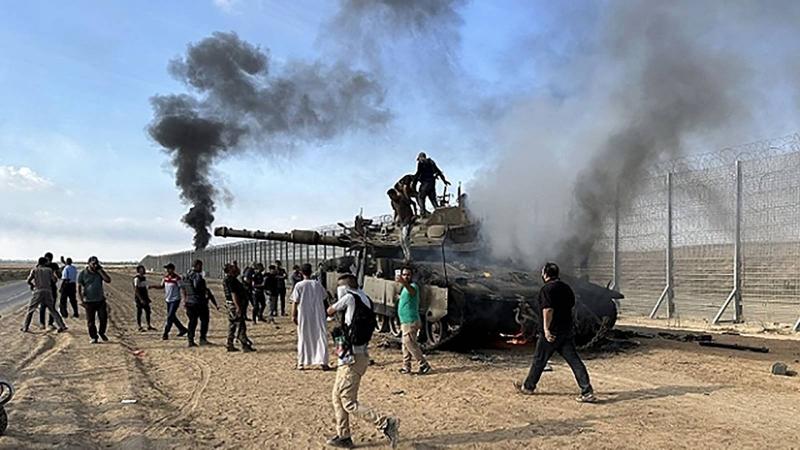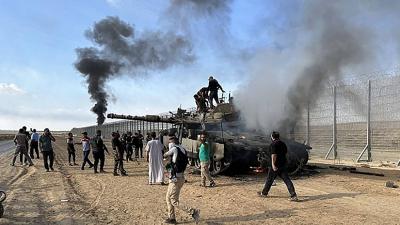Iran faces a dilemma following the Israeli attack on its embassy in Syria regarding how to respond without igniting a wider conflict, as Middle East analysts agree that Tehran seemingly does not desire such an escalation. The attack on the Iranian embassy complex in Damascus resulted in the deaths of several members of the "Revolutionary Guard," including two senior leaders, while Israel accelerates its long-standing campaign against Iran and its allied armed groups. Iran has vowed to retaliate.
Tehran has options; it could unleash its allied groups to carry out operations against U.S. forces, use them to strike Israel directly, or intensify its nuclear program, which the United States and its allies have long sought to curb. U.S. officials, speaking anonymously, indicated that they are closely monitoring the situation to see if the armed groups will attack U.S. forces stationed in Iraq and Syria, as they have in the past, in response to the recent Israeli attack.
Such Iranian attacks had ceased in February after Washington responded to the killing of three American soldiers in Jordan with dozens of airstrikes on Revolutionary Guard-linked targets in Syria and Iraq. U.S. officials noted that they have not yet received intelligence indicating that Iran-aligned groups are looking to attack U.S. forces.
Avoiding a Full-scale War in the Middle East
A source closely following the issue stated, “Iran is once again facing the dilemma of wanting to respond to deter Israel from conducting further attacks, while also wanting to avoid a full-scale war.” He explained, “They face that real dilemma... If they respond, it could lead to a confrontation they clearly do not want... They are trying to calibrate their actions in a way that shows readiness to respond but not to escalate.” He added, “If they do not respond in that case, it would truly be a sign that their deterrence is a paper tiger,” suggesting that Iran might target Israeli embassies or Jewish facilities abroad.
The U.S. official indicated that given the scale of the Israeli strike, Iran might have to respond by targeting Israeli interests rather than focusing on U.S. forces. Elliott Abrams, a Middle East expert at the Council on Foreign Relations, a U.S. think tank, also believes that Iran does not want a full-scale war with Israel but could target Israeli interests. He added, “I think Iran does not want a big war between Israel and (Hezbollah), so any response will not come in the form of a large move from the Lebanese side.” He continued, “They have many other avenues to respond... for example, by attempting to bomb an Israeli embassy.”
Iran could also react by accelerating its nuclear program development, which it has intensified since the U.S. withdrawal from the 2015 nuclear deal during former President Donald Trump’s administration, an agreement aimed at restraining Tehran's nuclear capabilities in exchange for economic benefits. However, the two most significant steps—enriching uranium to a purity of 90 percent, suitable for bomb-making, and reviving work on an actual weapon—could backfire on Tehran by invoking Israeli or American strikes.
The source noted, “Israel and the U.S. would view these solutions as steps toward obtaining a bomb... it would be a major risk. Are they prepared for it? I don’t think so.” John Alterman, director of the Middle East Program at the Center for Strategic and International Studies (CSIS) in Washington, does not expect a massive Iranian response to the attack on its embassy. He stated, “Iran's interest in teaching Israel a lesson is less than its concern about appearing weak to its allies in the Middle East.”
Strategic Consequences
In Tehran, Hossein Jaberi Ansari, a former deputy foreign minister for Arab and African affairs, stated that the attack on Zahidi and his colleagues is “an important event in the developments of the Middle East and will have implications in the short, medium, and long term.” In an editorial published by the reformist newspaper "Sazandegi," he highlighted various aspects of the event. He indicated that the level of the leaders targeted and their location is “an indicator of escalating confrontation between Israel and Iran.”
He called for an analysis of the strike on a political and strategic level, its messages, implications, and management. He discussed the trajectory of Iranian strategy expansion, starting with the Palestinian crisis, through the fall of the previous Iraqi regime in 2003, the developments of the Arab Spring, and the expansion of Iranian influence across military and security domains from the Mediterranean Sea to the Red Sea.
He also noted the collapse of Israel's deterrent system following the Al-Aqsa Flood attack on October 7, and the growing role of Iran-backed groups in Palestine, Lebanon, Yemen, and Iraq during the past six months. He remarked, “It is clear that Israel is affected by the Iranian revolutionary system and seeks to pursue a policy of extermination and mass killing in Palestinian territories while attacking resistance forces and Iran in the region.”
He described the Israeli attack on the consulate as “an impulsive action against the successes of Iran and resistance forces in Palestine and the region,” but asserted that “the direct and repeated Israeli targeting of Iranian goals will weaken Iran's strength and must not become routine,” warning against the severe erosion of Iran's deterrent capacity. He argued that “a level of response that does not subject Iran to internal and external pressures, rather than Israel, appears necessary.”
Jaberi Ansari explained that “Iran's presence and influence in the region have expanded, but alongside that, it has been unable to provide the necessary regional and international legitimacy for this achievement,” criticizing the “lack of attention to foreign policy priorities,” and adding, “Previous efforts to create legitimacy have lost their effectiveness due to internal disputes and systematic external actions, particularly by powerful figures in Israel and the U.S.”
On the other hand, he viewed that “the steady increase of certain problems, particularly the exacerbation of the crisis between segments of the population and the authority, undermines the yield of Iran's national power, hindering its ability to take the initiative abroad.”




